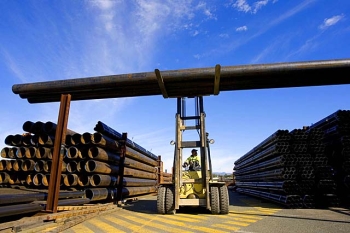Steel has several unique properties which makes it the material of choice while designing pipes for industrial use. For any industry, whether it is refineries, schools, automobiles, food or oil exploration – steel pipes remain the backbone supporting the process flow. Discussed here are the important benefits of using steel pipes.
1. Higher strength for a given pipe cross-section
In an industrial environment, the installed pipes need to be strong and should be able to withstand sudden stresses without breaking. No other metal would do as good as steel from a strength perspective.
For a given cross-section, steel has the ability to withstand much higher fluid pressures and stresses. In many industrial applications the fluid that is circulated through pipes has to be at a very high pressure and steel pipes can easily take up the stress without breaking. Besides, steel pipes also need much lesser real estate space as it can provide the required strength at a minimal cross-section.
2. Being anti-corrosive, they can be used to carry almost any material and can be placed in an environment
Corrosion is a major, silent hazard that can tear down the toughest and finest built structure in the world like buildings, jetties, dams, chimneys, industrial plants, port etc. The internal environment in an industry is usually very corrosive and most pipes may not be able to withstand it. Steel pipes, when coated with zinc, display anti-corrosive properties.
Hence, you can look forward to place steel pipes in a damp environment without bothering about its health. Steel pipes can carry almost any fluid – chemicals, water, gases without getting corroded. As far as chemical industry in concerned, there is no better material than steel as steel does not react with the chemicals. In the automotive industry, pipes are used to carry air and water and since steel is anti corrosive, it is a great fit for the application.
3. Tolerance to heat makes it suitable for high temperature application

Stainless steel pipes can withstand very high to low temperatures. They provide exceptional resistance to oxidation at very high temperatures and this is further enhanced with the addition of chromium. In industrial application, it is common to see processes running at very high temperature and the pipes which aid the process flow should be designed to deal with high temperatures, so naturally, steel is the most preferred choice.
4. Steel pipes are easy to clean
One of the important attributes that the food & beverage, dairy, and healthcare industry desire is hygiene in the manufacturing process. Stainless steel pipes are very easy to clean both internally and externally. Surface finishes are so done that it does not allow bacterial growth or biofilm formation.
5. Durability and value
While considering the benefits, it will be unfair to not talk about the financial viability vis-à-vis other material. Even from a financial perspective, steel makes immense sense for industrial use. Owing to the low maintenance cost, long life, easy installation and higher strength for a given cross-section, it would deliver a higher internal rate of return on your investment, when you compare it with other alternative piping materials. And because of minimal maintenance issues, there is very little downtime in industrial production, which is an added advantage of deploying steel pipes in industrial applications.
6. Customization
The properties of steel pipes can be made amenable to various applications by using additives like carbon, nickel, molybdenum, chromium etc. Desired temperature and corrosion resistance can be achieved by using these additives in various proportions. Thus, steel pipes can be customized for specific needs.
7. Flexibility in designing your piping network
Steel tubing and pipes provide flexibility to carry out any extension or reduction in the already laid out pipeline network. This aspect is particularly important in design of line pipes which are used for transportation of oil, gas or water.
With a variety joints that are available to connect steel pipes, it is possible to lay out the pipelines in the desired direction to meet the required constraints and conditions for managing the flow of processes. Steel pipes can also be welded with ease into different sizes to get the desired flow.
Owing to the innumerous benefits it offers, use of steel pipes is highly preferred in industrial use. Look for a trusted pipe supplier who can customize and design the pipes as per your needs.


